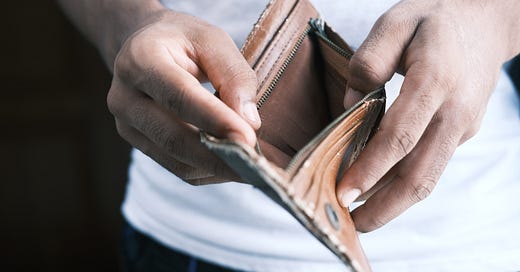Why do we feel so broke as 20-somethings?
I follow financial advice not because I am optimistic about my future, but because I have no choice but to believe in it.

Despite having lived through “unprecedented” economic conditions, personal finance advice has remained unchanged over the last fifty years: spend less than you earn, have a three-to-six-months’ emergency fund, and set aside at least 10% of your salary for long-term, low-cost investments.
I’ve taken that advice to heart, not because I am optimistic about my financial future, but because I have no choice but to believe in it.
I turned 27 last week. I celebrated at an American-themed bar that served HK$3 (US¢50) chicken wings on Mondays alongside hot sauces from ‘Hot Ones’. It was the first time I celebrated my birthday since moving to Hong Kong in 2014 because the wings deal made it very affordable for friends to attend. Whenever my friends and I chat about where to eat or what to do when we meet next, we can always count on someone to ask: “Sounds great, but can we go somewhere cheaper?”
A layer of financial anxiety seems to have found a grip on young people, and much of it can be attributed to how expensive the city is. Perhaps it’s because Hong Kong 20-somethings in 2019 earn up to a quarter less than 20-somethings in 1994 when adjusted for inflation, a trend that mirrors the global landscape as young people struggle to put together a down payment on a property before 30. In Hong Kong, the rental prices are so high that we effectively pay our landlord’s mortgage.
I inherited a big deal of financial anxiety from my parents, even as they, like many other people in their generation, own the house that they live in. We rarely went out for dinner and my parents constantly told us we do not have money. There is enough for the kids’ education, but barely anything more.
In junior high, I wanted so badly to hang out with my friends after school. They would usually pop by a cinema nearby and come to class the next day with new inside jokes that referenced the latest Marvel movie. My monthly allowance was the price of one cinema ticket, so I could join every few weeks to stay in the loop. My parents refused to give me extra cash for a soda drink. My dad instead told me that carrying a water bottle is free.
I didn’t know this then, but they were distressed about their financial standing. A series of investments in search of quick wins would have them swing from paying my tuition fees one year to going into debt to pay the next, a cycle that perpetuated in the first twenty years of my life and haunts every financial decision that I make.
Go slow
I write this as I sit in the same tiny flat I moved into from my first job. I have since doubled my salary, but I refuse to pay a single cent more for a more spacious living space because I don’t want to give into lifestyle creep, where you spend more as you earn more.
One way to have more money is to spend less. Just as I did since my first job, I cook and pack my own lunch. I brew my own coffee every morning instead of popping by a café. I still wear the same backpack from 2017. The fear of not having enough money pushes me to wrangle my expenses as best as I can.
But expenses grow. Groceries become more expensive. Plane tickets to see loved ones abroad are pricier than pre-COVID days. Colleagues at my new job like going out for fancy lunches. At every waking moment, I’m constantly wrestling with my bank account balance to reach a certain threshold: a down payment for a hypothetical flat that I could never afford.
Another way to have more money is to earn more over time. Scarred by my parents’ unlucky investment decisions, I opted to follow the tried-and-true financial advice and go slow. I deposit a chunk of my cheque monthly into a bucket of stocks or bonds, most commonly wrapped up in what the finance world calls “mutual funds” or “ETFs” and commit to not cashing out for at least thirty years. According to historical data, these investments should outgrow inflation.
I just hope that the greatest tailwind of all time, the global economy, has my back.





Rebecca, I love the honesty in your piece...we all struggle with knowing if following financial advice will pan out over the long run. Thanks for articulating this so well!
Ooh, I loved how you weaved your personal experiences into this. What a wonderful essay!
I like this "go slow" message.😊